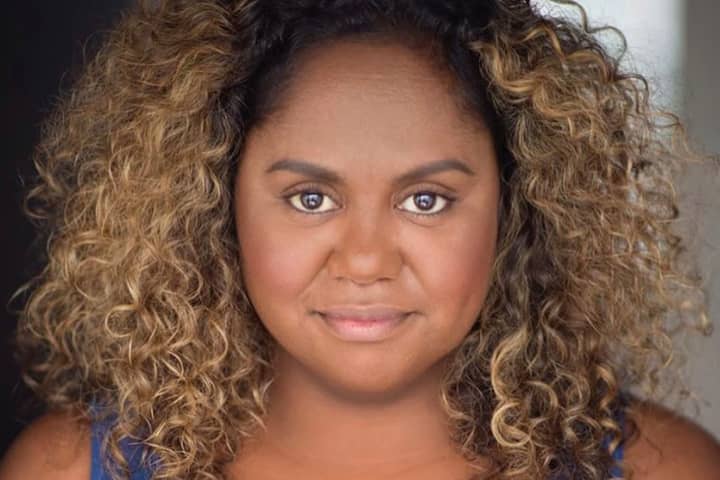Margot Morales Tanjutco was surprised to come out of the 2020 lockdown as a newly minted fan of horror. She’s now applying this new love to her comedy writing in the form of her definitely-not-autobiographical workplace tale, Dead in a Liveable City, which is part of this weekend’s Cybec Electric play readings.
What made you start writing for the stage?
I started as a performer but soon fell in with the wrong crowd: theatremakers!
After training in musical theatre for a couple of years, I was desperate to satisfy my creative hunger in other ways so I joined Malthouse Provocateurs where I met theatre folk who were making work at VCA, Melbourne Uni and independently. In the same year, I also got into comedy through the gateway drug of improv. I haven’t known peace since.
It blew my mind how bold local writers, cabaret artists and comedians were. They were so uniquely themselves and audiences were loving it so I was like ‘okay I gotta do that too or I’ll be sad forever!’
I was afraid of being myself for a long time; I barely even knew who that was. But seeing everyone just put on shows gave me the courage to do it myself. So basically I started writing for the stage because everyone else was.
Can you tell us more about your Cybec Electric play, Dead in a Liveable City?
Dead in a Liveable City is a corporate gothic comedy set in an office that Google Maps can never seem to find. Everyone is haunted by the histories and daily cruelties of what it takes to make a living. The characters are brilliant at their jobs as digital marketers for multinational property developers … but at what cost?
‘I don’t know what happened to me in lockdown but I emerged loving horror!’
Legally I must stress that this play set in a digital marketing agency is in no way, shape, or form based on my real life workplace, which also happens to be a digital marketing agency.
I also wanted to explore my comedy writing through a new lens of gothic/horror. So this play is also my first foray into that. I don’t know what happened to me in lockdown but I emerged loving horror!
Why this play and why now?
I wrote it to deal with my own volcanic frustration towards juggling full-time work, art and my ‘non-economic self’, if that is even possible. But there’s no way in hell I was just going to recreate my full time job (and life) onstage – I’m there for enough hours in the week, thank you.
So I threw some characters into this absurd, gothic world to externalise the dread I was feeling every day.
Cities and businesses are on a never-ending quest for expansion. At the height of lockdown we saw people turn against each other for things like JobKeeper, through accusations of laziness and who deserves a liveable wage. It was maddening. There were moments where people were like ‘we should slow down’ and everyone was like ‘yeahhh’ but once Melbourne was almost back up and running, everyone was back to the same old shit. We are trapped in this cycle of meaningless shit and I’m not convinced that people – the people on top and the dregs of middle management who prop them up like gods – actually want to change that. Not in any meaningful way.
For the record, my play is way more fun than my raw fury. I wrote it so I can wake up in the morning and not want to be dead.
Can you tell us more about your writing process; where you write and why?
Sometimes I come up with the title then write around it. This was one of those times. I think it helps me form boundaries which in turn gives me the freedom to explore. Whether it’s a play, song or sketch, creating the tone of a work is always an exciting and ongoing process. It’s lots of reading things, watching things, making mood boards … and then making yourself (or the actors) say the words out loud.
‘If an idea might be insufferable in any other form, then maybe it’s play. If I can see a set in my mind, then maybe it could work on stage. If I can sense the scale of a story or how big the cast might be, then maybe I can start building the world.’
I like writing and taking notes on the train. I spend a lot of time on public transport so I started out of necessity but now I just like it. Transitional spaces take the pressure off me and make me feel free to put anything down. I didn’t realise how much my writing practice depended on trains and cafes until lockdown happened and I wrote almost nothing.
I also have lots of random bits and pieces on both a notebook that I carry around with me and the Notes app. That way I never have to start with a blank page.
How do you know when an idea should turn into a play?
Unfortunately I just have to start in the dark and see what happens. If an idea might be insufferable in any other form, then maybe it’s play. If I can see a set in my mind, then maybe it could work on stage. If I can sense the scale of a story or how big the cast might be, then maybe I can start building the world. Needless to say, I still find it challenging to decide!
What excites you most about your participation in Cybec Electric 2021?
I’m so happy to be working with other people. I’m thrilled that I don’t have to be alone in trying to figure this show out, that I have the support and insights of Chris Mead, Stephen Nicolazzo and the actors along the way.
The Cybec Electric play readings run from 19 to 20 February 2021 at Southbank Theatre.
Cybec Electric forms part of MTC’s ongoing commitment to the development of new Australian writing, and is only possible due to the support of the late Dr Roger Riordan AM and The Cybec Foundation.
Published on 16 February 2021





